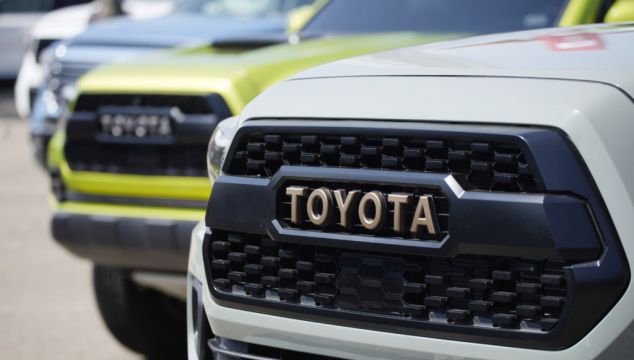Toyota has reported an 8.1 per cent drop in fiscal third quarter profit as a global shortage of computer chips and soaring raw material costs battering the industry hit Japan’s top carmaker.
The firm’s October-December profit totalled 727.9 billion yen (€5.2 billion), down from 791.7 billion yen (€5.6 billion) the previous year.
The company said it is doing its best to find other chips suppliers to keep up with demand. Higher material and energy costs slashed profitability, it said.
Toyota kept its global consolidated vehicles sales forecast for the fiscal year, which ends in March, unchanged at 10.4 million vehicles. That would be little changed from what it sold in the previous fiscal year, at 10.38 million vehicles.
It expects to sell more Toyota and Lexus vehicles in Japan but sell less in the US and the rest of Asia, it said.
Quarterly sales rose 25 per cent to 9.75 trillion yen (€69 billion).
Toyota said although its operating income in Japan got a boost from currency fluctuations recently, in which the Japanese yen has dropped against other currencies, that hurt its profits in the US and Europe.
A weak yen lifts the earnings of Japanese exporters like Toyota by boosting the value of their overseas earnings when converted into yen. The US dollar was trading at about 115 yen a year ago but is now at nearly 130 yen.
Toyota expects to earn 2.36 trillion yen (€16.8 billion) in profit for the full fiscal year, unchanged from its earlier forecast. That’s lower than its year-ago annual profit of 2.85 trillion yen (€20.3 billion).
Akio Toyoda, grandson of the company founder, plans to step down as Toyota’s chief executive while staying on as chairman in a move apparently aimed at freshening up its image and highlighting that it is shifting gears for a new era of electric vehicles.
The new chief executive, Koji Sato, is in his 50s, young by Japanese standards for top management at mainstream companies. He has an engineering background and has worked in the Lexus luxury brand division and branding operations and at Toyota Gazoo Racing Company.
Mr Sato will be steering Toyota’s move to greener vehicles, including electric and hydrogen-powered cars. The personnel changes, which kick in on April 1st, need shareholders’ approval, scheduled for the next general meeting.
Like the rest of the industry, the maker of the Camry sedan, Prius hybrid and Lexus luxury models faces various challenges, including rising interest rates, inflation, fluctuating exchange rates and political uncertainties around the world.
The global car industry has been slammed for some time by supply chain crunches because of disruptions from the pandemic.







